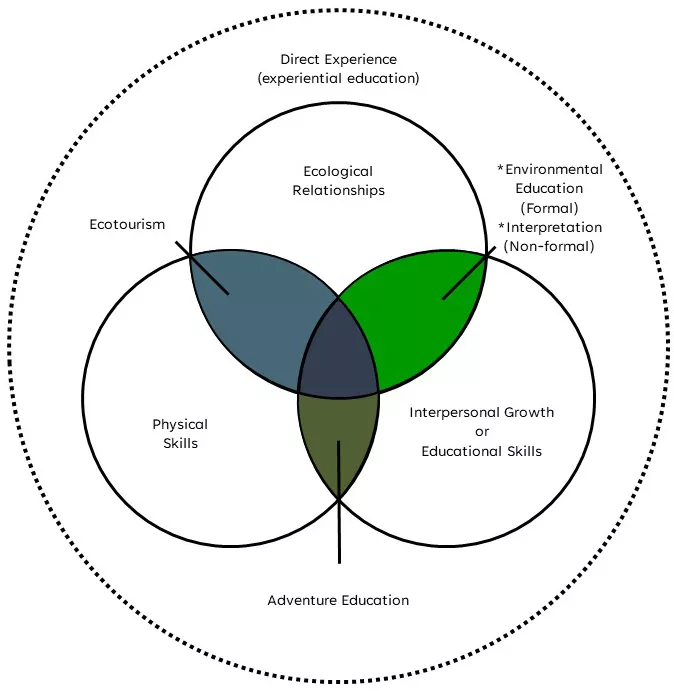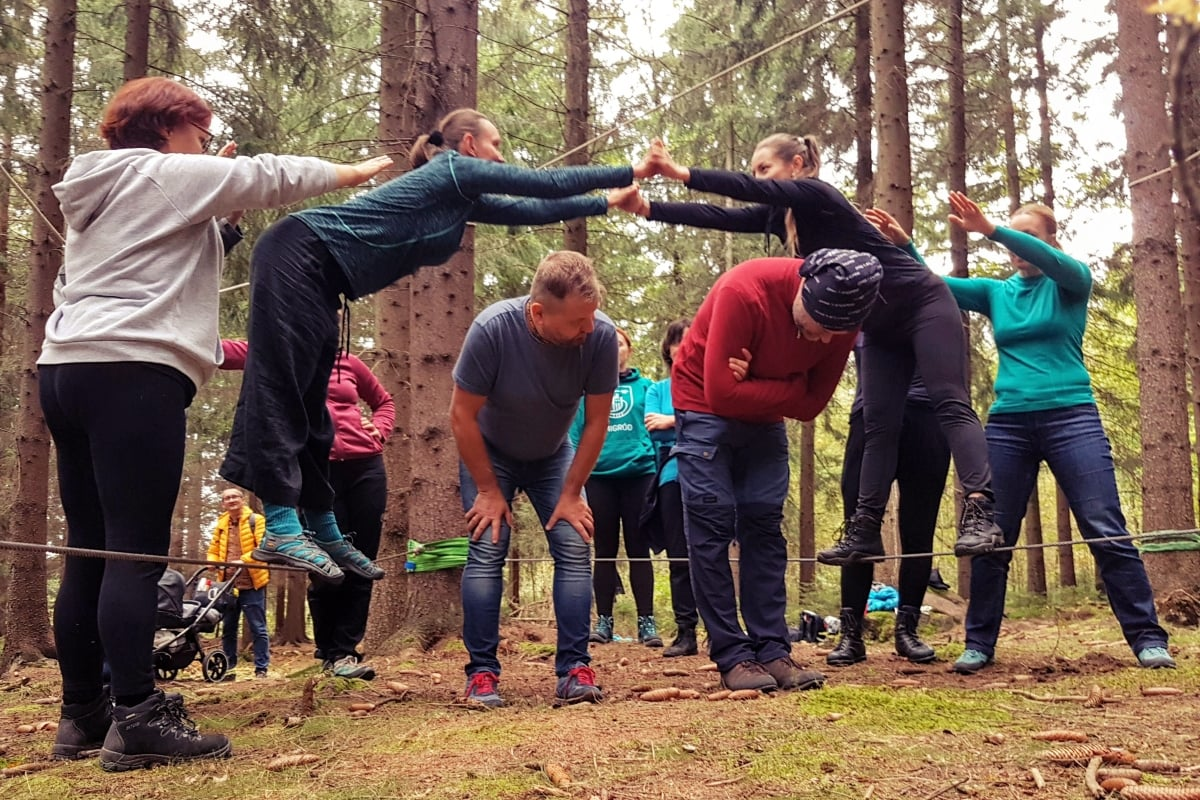Outdoor education in adult learning
5 min read - like, share, comment!
First published in Polish by Agnieszka LEŚNY
For some, the term 'outdoor education' may nominally be associated with forest kindergartens and environmental education. In fact, nothing could be further from the truth! It is actually a great approach when it comes to adult education.
Outdoor education is a popular trend, designed mainly for working with youth and adults. The term first began to appear in specialist literature in the 1940s.
In Poland, outdoor education has developed in various forms since the 1960s [1] and has been present in educational discourse in its contemporary format since the first decade of the 21st century. Although there are numerous publications, articles, courses and even degree programmes in this field, there is no unified definition of outdoor education that can be agreed upon by the educational community in Poland – and, indeed, in other countries.
I touch more upon the components of outdoor education and how it can be applied in the below video [2]:
The definition of outdoor education closest to my heart is cited in the book Adventure Education[3], which states that outdoor education is the process of designing, transferral and implementing a process of development within a natural environment. This approach assumes that the use of the natural environment is purposeful (instead of, for example, 'simply' taking a trip to the forest) and that the process itself is guided by a trainer/leader/facilitator who uses contemporary knowledge of leading the development processes (usually in the methodology of experiential education, i.e., learning through experience).
The methods most often used in outdoor education are excursions (less often, expeditions), camping trips, outdoor games and activities (including using a low rope course), and elements of climbing and water sports. Activities are carried out in a group, though the purpose is most often the development of individuals through group activity and team building. In other approaches, for example, in adventure education, the developmental process is reinforced using more intensive, sometimes extreme forms of recreation (for example, rafting, high rope parks, expeditions), while in wilderness/adventure therapy, the emphasis is on a longer group process, often of a socio-therapeutic nature.
The complicated relationship between outdoor activities aimed at interpersonal growth and development vs environmental education is illustrated by one of the accepted models of outdoor education components [4]:

It is worth noting, however, that this is not the only approach, and there is an ongoing definitional debate over the components and interrelationships of 'adventure', 'outdoor', and 'experiential education'.
Why not for children?
As the interest in forms of education for children set in the natural environment has grown, the term 'outdoor education' has come to be understood in Poland literally as "education conducted outdoors" and merged with outdoor learning. This is a gross oversimplification. Although outdoor education can be understood as many developmental forms (used mainly in informal education) - from local environmental education projects through sightseeing trips to developmental excursions[5], the European pedagogy has adopted a distinction between two specific approaches. The first being' learning outside the classroom' or 'environmental education' (understood as a supplement to education in the formal system, for example, outdoor teaching aimed at a better understanding of the natural environment). The second – 'outdoor education' –is understood as programmes for developing soft skills through being active and taking risks outdoors, in the natural setting.
To maintain this differentiation, I use the terminological distinction of environmental education and adventure pedagogy (the equivalent of outdoor/adventure education).
The outdoor education approach understood in the above terms is not recommended for younger children because the key elements of this approach are analysis, reflection, and transfer of experiences from outdoor 'adventure' to everyday life (according to Kolb's Learning Cycle and the Knowledge Transfer theory). This, of course, does not imply the assumption that younger children cannot learn and reflect on their experiences. However, in their case, by using outdoor education methods, we can work on their emotions, their interpretation of events and, to a lesser extent, on reflection and analysis - this is a direct consequence of developmental psychology. Working on the group process, an important part of outdoor education activities is also very different for children. Therefore, for younger children, outdoor activities are, to a greater extent, valuable fun rather than a developmental or training process, and this approach itself is recommended in adult education.

Would you like to find out more?
The contemporary discussion on outdoor education in Poland was initiated in 2011 at the conference "Edukacja Przygodą" (Education Through Adventure), which has had further editions in subsequent years. Post-conference publications included three publications exploring this topic in Polish:
-
Leśny, Agnieszka; Palamer-Kabacińska, Ewa. (red.) (2012 ) Edukacja Przygodą. Outdoor i Adventure Education w Polsce: teoria, przykłady, konteksty, Pracownia Nauki i Przygody, Warszawa
-
Bąk, Agnieszka; Leśny, Agnieszka; Palamer-Kabacińska, Ewa. (red.) (2014): Przygoda w edukacji i edukacja w przygodzie. Outdoor i adventure education w Polsce. Warszawa: Fundacja Pracownia Nauki i Przygody
-
Dudek, Mateusz; Kida, Paulina (red.) (2016), Przewodnik po edukacji przygodą w Polsce, Pracownia Nauki i Przygody, Warszawa
-
Michl W., Pedagogika przeżyć, Wydawnictwo WAM, Kraków 2011
-
Ryszka R. (2016), Pedagogika przeżyć praktycznie, Wydawnictwo IMPULS
wilderness therapy:
- Magdalena Szeniawska; Michal Vičar Jak prowadzić proces wilderness therapy
In the comments below, I encourage you to discuss outdoor education as a method of adult education and development.
Agnieszka Leśny – MSc in Education, MSc in Anthropology of Culture, PhD candidate in Education. According to Clifton StrengthsFinder, my top 5 tallents are: learner, strategic, communication, input and woo (winning others over). And I agree with that. I am a trainer which bases my work on simulation games. I am promoter of ideas and methods of experiential education in Poland. Based on my academic background, I am working as an expert in transferring scientific theory into management practice. I have working experience in public administration, cultural institutions, businesses and non-governmental organizations. I am the founder of ngo Manufacture of Science and Adventure. I am working as a freelanced trainer and as an expert in Research&Development Dep. w PGS Pracownia Gier Szkoleniowych. I am a leader of trainers in my organization and I am a tutor in our volunteer program.
Crisis, conflict and trauma during training (part #1)
How to deal with trauma during a training? (part #2)
[1] Włączając w ten nurt ruch skautowy, można przyjąć, że nawet w pierwszej dekadzie XX w.
[2] Materiał powstał w ramach projektu "Skrzydła dla STOP" realizowanego przez Stowarzyszenie Trenerów Organizacji Pozarządowych finansowanego ze środków otrzymanych z NIW-CRSO w ramach Programu Rozwoju Organizacji Obywatelskich na lata 2018-2030 PROO.
[3] Miles John, Priest Simon, Adventure education, wydania od 1990.
[4] Opracowanie własne na podstawie: Gilbertson K., Bates T., McLaughlin T., Ewert A.,Outdoor Education. Methods and Strategies, Human Kinetics, 2006.
[5] Rickinson, M., Dillon, J., Teamy, K.,Morris, M., Choi, M.-Y., Sanders, D., & Benefield, P. (2004): A review of research on outdoor learning. Shrewsbury: Field Studies Council Publications.
Comments
Świetnie, że to tłumaczysz!…
Świetnie, że to tłumaczysz! Bez odpowiedniego słowa idea "outdoor education" ginie pomiędzy ofertą przedszkoli leśnych i wspólnych wyjazdów za miasto. A ten koncept zawiera bardzo wartościowe metody nauki korzystające z niezwykłego wpływu obcowania z innymi w naturze. Stawiania czoła przemyślanym wyzwaniom, ale także czasu na refleksję, wnioski... Marzy mi się dokładnie takie mądre przeżycie!
Nigdy nie brałem udziału w…
Nigdy nie brałem udziału w takich zajęciach, a bardzo bym chciał! Wydaje mi się to nie tylko dużo bardziej atrakcyjne, ale i bardziej skuteczne niż warsztaty w sali. Jest tutaj przygoda, wyzwanie, autentyczne doświadczenie, a nie tylko jego namiastka. Niezależnie od konkretnego celu edukacyjnego, w takim kontekście nauka to musi być przyjemność...
polecam Erasmusa!
@Krzysztofie - na szczęście outdoor education jest bardzo popularnym podejściem w projektach Erasmus+ w bardzo różnych akcjach. Jeśli ciągnie Cię aby spróbować, polecam którąś z wyszukiwarek projektów Erasmusa, np. Salto - tak wystarczy wpisać w słowa kluczowe "outdoor education" i łatwo wyszukać jest projekt :)
Rzeczywiście tych definicji…
Rzeczywiście tych definicji jest wiele... Czasem zastanawiam się na ile są one uzasadnione, a na ile służą dysputom akademickim lub celom marketingowym... Ja uczyłam się edukacji "outdorowej" w Niemczech i dlatego najbliższa jest mi pedagogika przeżyć oparta na koncepcji Kurta Hahna. Cały cykl szkoleniowy dla trenerów był oparty na tych założeniach. Kiedy analizuję inne koncepcje nawiązujące do pedagogiki przygody to zbiór wspólnych założeń i rozwiązań metodycznych jest bardzo duży. Czasem różnice dotyczą szczegółów albo sfery celów. Jednak obojętnie jak to nazwiemy wartość edukacyjna tego typu rozwiązań jest nie do przecenienia :)
definicje...
@Małgorzato, to fakt, że część środowiska zadaje nam pytanie czemu służą niuanse i spieranie się o definicje. Nawet jeśli służą one "tylko" dysputom akademickim - to są bardzo ważne. Badania i prace akademickie mogą wzbogacić praktykę tej metody. Jako akademiczka - uwielbiam te spory i czuję, że inspirują mnie one i otwierają oczy na inne podejście do praktyki. Np. jedną z ważnych różnic pomiędzy pedagogiką przeżyć Hahna a outdoor education jest oparcie tej pierwszej na ówczesnej "diagnozie" bolączek społeczeństwa i kształtowaniu pedagogik przeżyć jako odpowiedzi terapeutycznej na problemy społeczne. To charakterystyczna cecha tylko tego nurtu.





Brałam udział w warsztatach…
Brałam udział w warsztatach i jestem pod wrażeniem głębokości doświadczeń. Cała struktura oraz scenariusz działań jest spójny. Są emocje, jest kontakt, współpraca, relacje, komunikacja, "zabawa" z której sporo można dowiedzieć się o sobie, jest feedbeck.
Cenna wartość tego warsztatu, którą można fenomenalnie przełożyć na codzienne działania w swoim otoczeniu na spacerze, wyprawie.
Kojąca dla wrażliwości, zmysłów i stanu ducha ma przestrzeń natury gdzie realizowane są casy.. Sprawia to, że czujemy wszystko inaczej. Zmniejsza się lub znika napięcie towarzyszące na sali szkoleniowej, skraca się dystans międzyludzki.
Czuję wdzięczność za niebanalną przygodę, piękną przestrzeń do refleksji o współpracy i doświadczania innych metod pracy trenerskiej np. na niskim parku linowym.
Czekam na materiały bo totalne zaangażowanie nie pozwoliło mi na skrupulatny zapis.
Jesteście wspaniałe dziewczyny !!!
Robicie coś NAPRAWDĘ WIELKIEGO !!!